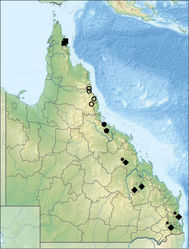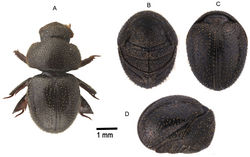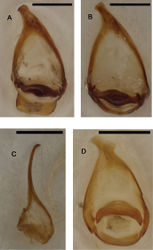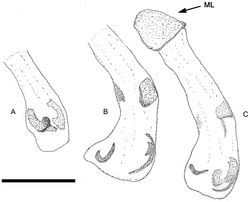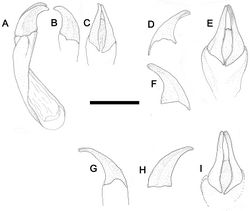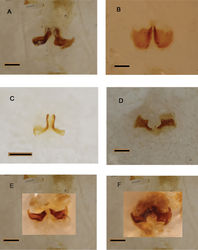Pterorthochaetes storeyi
| Notice: | This page is derived from the original publication listed below, whose author(s) should always be credited. Further contributors may edit and improve the content of this page and, consequently, need to be credited as well (see page history). Any assessment of factual correctness requires a careful review of the original article as well as of subsequent contributions.
If you are uncertain whether your planned contribution is correct or not, we suggest that you use the associated discussion page instead of editing the page directly. This page should be cited as follows (rationale):
Citation formats to copy and paste
BibTeX: @article{Ballerio2013ZooKeys339, RIS/ Endnote: TY - JOUR Wikipedia/ Citizendium: <ref name="Ballerio2013ZooKeys339">{{Citation See also the citation download page at the journal. |
Ordo: Coleoptera
Familia: Hybosoridae
Genus: Pterorthochaetes
Name
Pterorthochaetes storeyi Ballerio, 2013 sp. n. – Wikispecies link – ZooBank link – Pensoft Profile
Type locality
Thompson Creek, Daintree, Queensland, Australia.
Type material
Holotype, male (QM, registration number QMT93436): Daintree, NE Queensland: Thompson Creek, 16°06.31S, 145°26.25E, 140 m, Trunk FIT #16, 09/11/98-19/12/98, leg. Simon Grove. [extended specimen, glued on a card, dissected, genitalia mounted in DMHF resin on a separate card, same pin]. Allotype: 1 female [dissected], 1 female, Daintree, NE QLD: Thompson Creek, 16°06.31S, 145°26.25E, 140 m, Trunk FIT #24, 19/12/98–26/01/99, leg. Simon Grove (QPIM). Paratypes [6 males and 5 females dissected]: 1 male, Daintree, NE QLD: Thompson Creek, 16°06.31S, 145°26.25E, 140 m, Trunk FIT #01, 09/11/98-19/12/98, leg. Simon Grove (ABCB); 1 female, Daintree, NE QLD: Thompson Creek, 16°06.31S, 145°26.25E, 140 m, Trunk FIT #9, 19/12/98–26/01/99, leg. Simon Grove (QPIM); 1 female, Daintree, NE QLD: Thompson Creek, 16°06.31S, 145°26.25E, 140 m, 04/02/99, Night hand colln. #E9, leg. Simon Grove (QPIM); 1 male, Australia, N. Qld., Tully Falls S. F. 730 m, 18 km SSW Ravenshoe, 18.I.1988, Storey & Dickinson (QPIM); 1 male, Australia, N. Qld., Danbulla S. F., 1 km NE of Yungaburra, 13.II–6.III.1987, Storey & De Faveri (QPIM); 1 male, Worgabel S. F. via Atherton, 26.XII.1988, R. I. Storey at light (QPIM); 1 male, NEQ: 16.26S, 145.20E, O’Donoghue’s Falls, 15–16 May 1995, 150 m, leg. Monteith, Ford & Slaney (QM, accession number T189543); 1 female, Daintree, NE QLD: Thompson Creek, 16°06.31S, 145°26.25E, 140 m, Trunk FIT #14, 09/12/98-26/01/99, leg. Simon Grove (QM, accession number: T189774); 1 male, Daintree, NE QLD: Thompson Creek, 16°06.31S, 145°26.25E, 140 m, 05/02/99, Trunk Knockdown #24, leg. Simon Grove (QM, accession number: T189775); 1 male, Daintree, NE QLD: Thompson Creek, 16°06.31S, 145°26.25E, 140 m, Trunk FIT #8, 09/12/98–26/01/99, leg. Simon Grove (QM, accession number: T189776); 1 male, QLD: 17.221°S, 145.761°E, Goldsborough Rd. 12.5 km past bridge, 16–17 Sept 2010, G. Monteith RF Barkspray 34575 (QM, accession number: T189777); 1 female, QLD: 16.202°S, 145.409°E, Lync-Haven Daintree Area, 2 Dec 2012, F. Turco, rainforest, 35 m, barkspray on logs, 18742 (ABCB).
Description
Size: HL = 0.70 mm; HW = 1.44 mm; PL = 1.50 mm; PW = 2.40 mm; EL = 2.66 mm; EW = 2.29 mm. Overall morphology as in generic description. Black, shiny, setation yellowish, sternum, tarsi and antennae reddish-brown.
Head: completely and uniformly covered by impressed coarse punctation, punctures transverse, comma shaped on disc, horseshoe-shaped (with opening towards internal side) at sides of disc and on frons. Anterior portion of clypeus with irregular transverse anastomosing lines. Interocular distance about 11 times the maximum width of dorsal ocular area.
Pronotum: margins completely bordered, lateral margins with a row of erect thick yellowish simple setae, longer than their distance. Pronotal setation made of thick medium sized clavate yellowish setae. Punctation as follows: disc covered by impressed transverse comma shaped punctures, with posterior openings and having a small fine setigerous pore near inferior side, sides of disc with a few ocellate punctures and sides of pronotum with larger horseshoe-shaped punctures with opening directed laterad. Anterior angles having six longitudinal irregular lines. Distance between punctures subequal to their diameter.
Scutellum: basally with two longitudinal irregular rows of horseshoe-shaped punctures, uniting towards apex.
Elytra: humeral callus poorly pronounced, sutural stria occupying the medial and distal third. Elytral punctation as follows: mixed simple fine punctures and longitudinal comma-shaped punctures with opening laterad, becoming horseshoe-shaped at apical third and at sides of elytra. Each comma-shaped and horseshoe-shaped puncture bearing bearing a clavate yellowish seta. Apical third of elytra with a few ocellate punctures. Interpunctural distance on elytra being larger than the diameter of punctures.
Aedeagus: basal piece about two times as long as parameres. Parameres slightly asymmetrical, internal sac with distally some irregular weak sclerotisations (Fig. 12B, Fig. 13G–I).
Male genital segment: as in Fig. 11A.
Bursal sclerites: strongly asymmetrical, as in Fig. 14A, E, F and subject to strong variability.
Diagnosis
Pterorthochaetes storeyi sp. n. can be easily identified among the other Australian Pterorthochaetes because of the distinctive punctation pattern of elytra, with punctures sparser and shorter than in Pterorthochaetes danielsi sp. n. (usually with long comma-shaped punctures, rather than true horseshoe-shaped punctures as in Pterorthochaetes danielsi), smaller, shorter and more impressed than in Pterorthochaetes simplex. The shape of bursal sclerites is also very distinctive and unique within the Australian Pterorthochaetes.
Etymology
Dedicated to Ross Storey (1949–2008), former technician at Queensland Department of Primary Industries, Mareeba. Noun in the genitive case.
Distribution and habitat
Known from the Queensland Wet Tropics (sensu Adam 1992[1]), where it occurs in lowland rainforest areas. Adults were collected mainly with flight intercept traps or at light. The Pterorthochaetes simplex quoted by Grove (2000)[2] are actually specimens of Pterorthochaeres storeyi sp. n.
Original Description
- Ballerio, A; 2013: Revision of the Australian Ceratocanthinae (Coleoptera, Scarabaeoidea, Hybosoridae) ZooKeys, 339: 67-91. doi
Other References
- ↑ Adam P (1992) Australian rainforests. Oxford Biogeography Series 6. OUP 308 pp.
- ↑ Grove S (2000) Impacts of forest management on saproxylic beetles in the Australian lowland tropics and the development of appropriate indicators of sustainable forest management. Thesis. James Cook University, 378 pp.
Images
|
